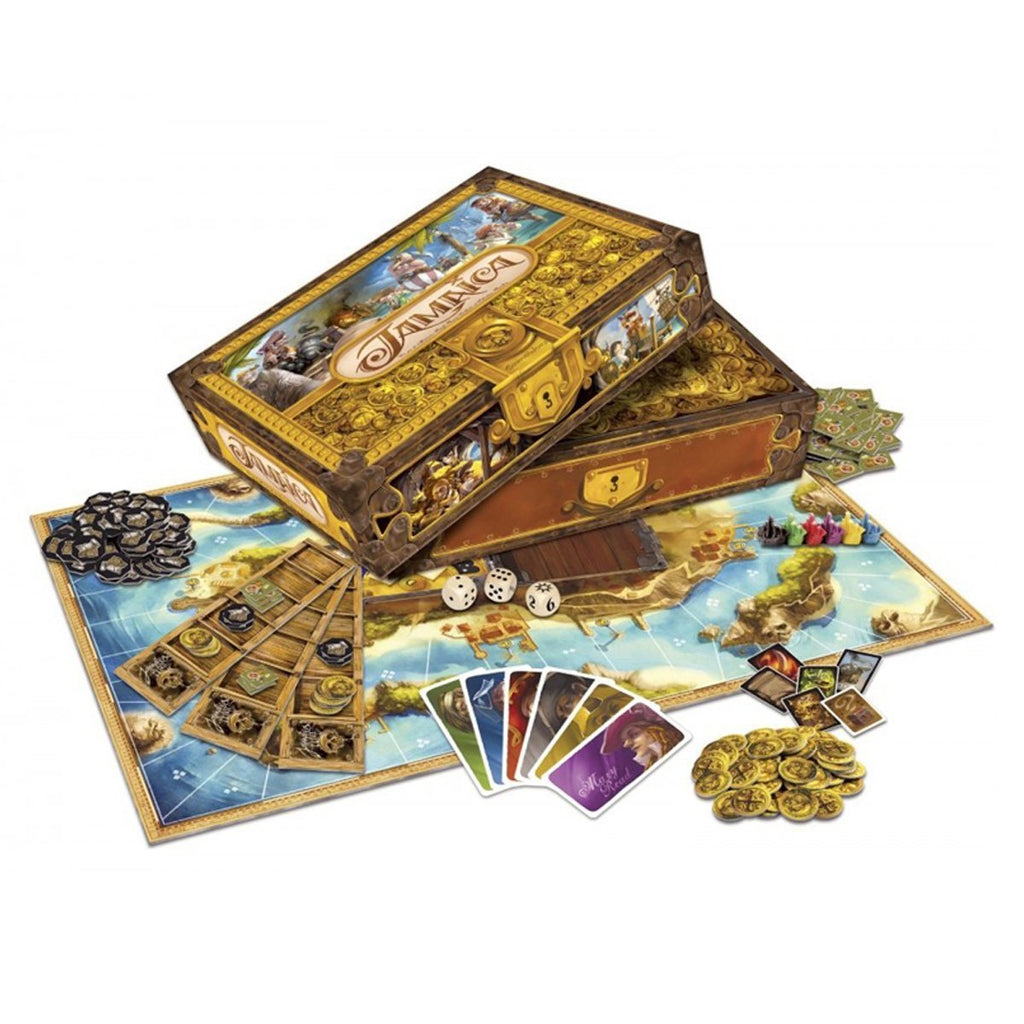Today Jaya writes his first ever functional review – an often overlooked gateway title ‘Jamaica’: One of the first tabletop games he ever purchased, and still one he regularly takes out with new friends.
Player activity summary
Jamaica is a competitive, pirate-themed racing game in which players have to complete a lap of an island, managing their resources of food, doubloons and gunpowder. They will score points based on how far round the island they manage to get by the end and the amount of doubloons they have in their holds. They can gain or lose further points based on the treasure cards they’ve picked up on the way. Each turn the captain (first player) will roll two six-sided dice and assign one as the ‘day’ dice and one as the ‘night’ dice. then all players simultaneously choose a card from a selection of three in their hand to play for the turn. All players then reveal their selected cards and in order resolve the two actions on their card (movement forwards/backwards or gaining one of the resources) in a quantity corresponding to the ‘day’ and ‘night’ dice. Moving often requires spending food or doubloons to avoid slipping backwards and if players land on the same space as each other they have a fight, rolling a fight die to determine the winner; the odds of which can be manipulated through use of gunpowder.
What treasure have ye found?
The first thing you’ll notice about Jamaica is that the product design and production quality are top notch. The box has a lock design on the outside so that when the lid is lifted, it reveals unlocked artwork underneath. The rule book cover art is a trove of gold coins making it look like you’ve opened a treasure chest. Opening that gold-laiden rulebook up reveals it’s been designed to look and read like a treasure map and looking into the rest of the box reveals an elegantly designed insert. Every component has a clear separate compartment: chunky coin tokens (with heads and tails sides), gunpowder and food tokens. Each pirate ship miniature has its own perfectly sized slot, the dice are wooden and chunky, there’s a huge round compass for the captain and some nice looking long card strips for the ship holds. It is immediately clear upon opening this box where everything is supposed to be stored, which is refreshing when so many games’ inserts function only as factory packaging (Yes FFG, I can see you sweating over there in the corner). Not many games consider their audience’s experience of opening the box, but here, every component and the path you take to reach them has taken a step towards immersing you in the theme of treasure and piracy. Even when that ‘wow effect’ wears off on you personally, there’ll always be someone else at the table you can show it off to letting you enjoy it again vicariously through them.
The nice insert, beyond just offering the generally pleasing sensation of seeing lots of objects neatly organised in their proper places, expedites set-up and take-down significantly which makes the prospect of getting it off the shelf at home an easier mental leap than doing the same for similar sized games you may have in your collection. The question ‘shall we play x game?’ has often been turned down in my time because one or more players feel like the set-up is too much work. But here, the inset directly tackles this issue. Everything in the box also pops with colour: making all the components and board features easy to identify at a glance. It’s immediately engaging for newcomers to games and/or children; much more than large icon heavy, boards do.
As a final touch, all the art on the player actions cards link together to form a continuous image, pushing further engagement and providing an optional small puzzle in itself. ‘Did you know, all the cards in your deck join together to make one big picture?’: This sentence has always caused people to immediately dedicate themselves to the task of finding this bigger image; just for fun or the satisfaction of seeing it completed.
Gateway to adventure
There’s a moment when you’re describing or teaching a game to someone unfamiliar with modern games where you suddenly know you’ve lost them: You’ve said too many things about mechanics and systems which the new player has no frame of reference. Their eyes glass over and it’s too late: Too late to win them back on this game, too late to just stop the whole thing and play something else; too late to run.
Jamaica is an effective gateway title because it uses frames of reference that players completely unfamiliar with hobby games already have. But it mixes them and subverts them with modern boardgame ideas. They learn quickly; starting the former ‘monopolites’ off on journey to greener pastures. Jamaica has roll-to-move mechanics, it has you pay money when you land on some spaces and draw treasure chest cards that have a chance of being good or bad for you when you land on other spaces. Those are all features of Monopoly. However here there is no player elimination, no obscene unchecked runtime and just enough control and choice added to create a balanced experience.
Jamaica takes something a player will have done before and adds a touch of agency that wasn’t there before: A player’s hand only ever has three or at most four cards in it and those cards only have a combination of two icons on them out of a pool of five. The captain has the power to order the dice, a simple choice between A-B or B-A. The track players race around splits occasionally but is only ever ‘slow lane with treasure’ or ‘fast lane that’s more taxing to stop in’. There’s a a very simple amount of resource management gameplay to be had: trying to have as many goods in your hold as possible while making sure you don’t have to throw them overboard or leave yourself prone to heavy losses in combat. The options are simple while also making you feel clever for making good choices. That’s not just an illusion of choice either. After enough games, it also becomes clear that making good decisions will win out over raw luck. Thankfully with its quick playtime, many games can be played in a row. More consistently than any other titles, this has my guests asking ‘can we play again?’: Proof that Jamaica has got something right.
A pirate’s life… isn’t for everyone
For those with a taste for more sophisticated games there are some luck elements which may be less welcome. Jamaica’s combat feels good to win but bad to lose. The existence of the ‘explosion’ face on the die which instantly wins a battle as soon it’s rolled – even if your opponent put in lots of gunpowder – can often lead to frustration or a sense of injustice: even if it is positive that the underdog can still get lucky; making no battle a forgone conclusion. There are also other actions players can take to mitigate the negative effect of combat. Because your opponent can only steal only one hold of loot from you or a treasure you can manage your holds in a certain way to reduce the blow when they do. Since treasures can also have a negative effect, stealing those is a risk for them. Combat is also relatively infrequent, especially at lower player counts making it, a fun piece of occasional drama. Given the game is about piracy, acts of theft and treachery and scrappy interactions feel slightly more precedented. While the scale and range of the effects of the randomly drawn treasure cards (+7 to -4 or a rule changing effect) could again engender a sense of injustice, the very varied nature leads to a real sense of excitement about what you will get when you land on a treasure space. It’s the kind of hit you get from gambling something. The very fact it isn’t just a numerical modifier – but could be one of many wide ranging outcomes makes the draw genuinely more exciting. Since this removes one of only 9 treasure tokens from the game, it engenders a real sense of ownership and of being lucky: all of which fits the theme of buried booty perfectly.
If these effects were balanced out too much (for example making treasure a fixed value of +5) the emotional appeal of unearthing buried treasure to see what you can find would be lost. The game mitigates the potential of feelings of unfairness as much as it can: negative cards are less frequent and consistently lower than the positive ones, ensuring excited treasure hunters are still more likely to come out in profit than not. Some eurogamers (assuming they want to enjoy something light between sessions of historically-set intensive livestock farming) could find the lack of control annoying and the overall experience too lightweight, but for its target audience of new gamers and children who have been brought up to accept a larger role of luck, it is spot on.
By borrowing mechanics from the most well known titles on the market and dousing them with a healthy amount of decision making and some very user-friendly and appealing product design, Jamaica creates an excellent, wide-appeal racing game.


Leave a comment